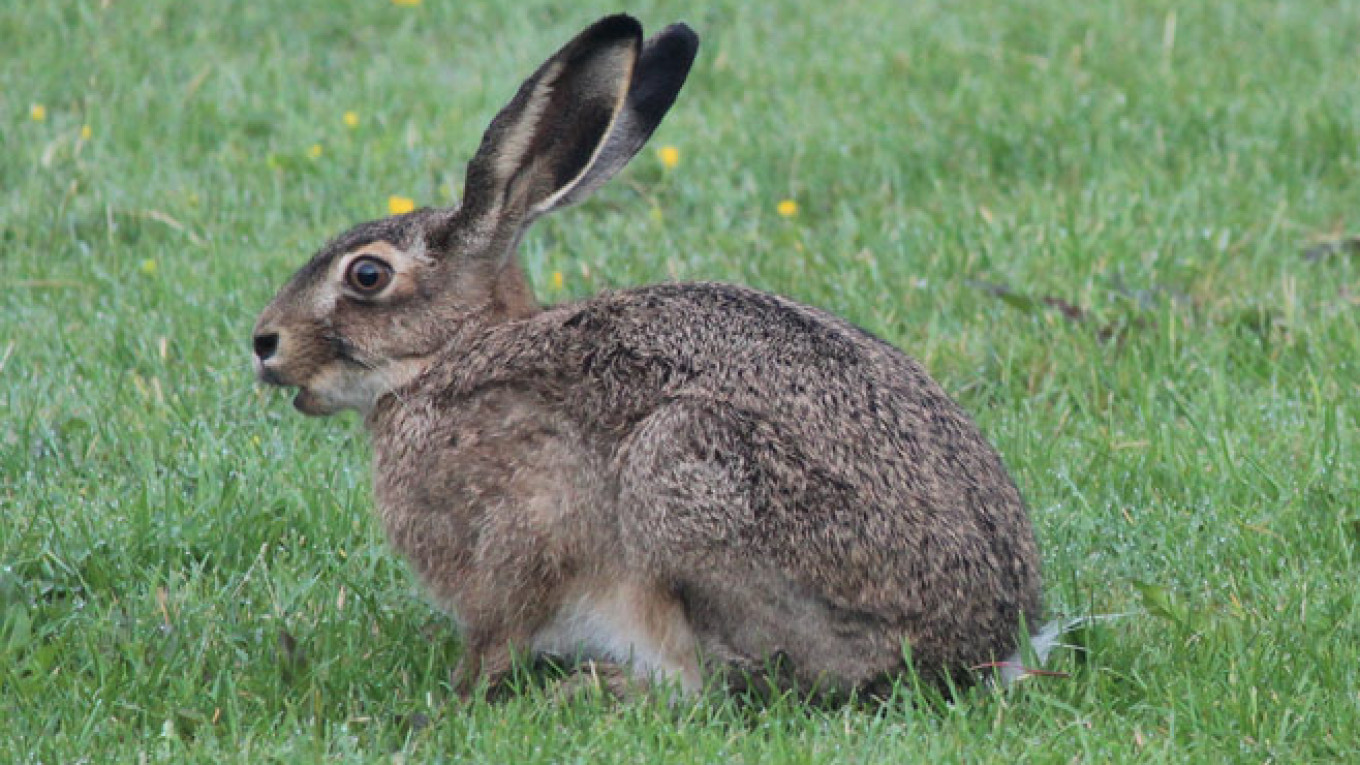?—?°́???‡???? ?????±?°́: harelip
Now here's something you don't read every day: ?????????‹?? ?·?°???† ?? ???????‚???»?µ?‚???? ???°???°?» ???° ???????‚?€???»?‘?€?° ?? ???????????????????? ???µ?‚?€??. (A drunk jackrabbit armed with a gun attacked a ticket inspector in the Moscow metro.)
Man, it's a jungle out there.
All right, all right. I'm having some fun — although the headline is real. The thing is that ?·?°???† is slang for a fare evader, i.e., someone who jumps the turnstile or bypasses the ticket inspector and rides for free.
Often this refers to riding public transportation: ?????° ???€?µ???€?°?????? ?·???°?»?°, ???°?? ?????±?€?°?‚?????? ???? ???????? ?·?°????†?µ?? ???° ?‚?€???»?»?µ???±?????°?… ?? ?‚?€?°?????°???…. (She knew how to get home on the trolleybus or tram without paying for a ticket.) Or being a stowaway on a ship or plane: ?—?°???†?‹ ?????????‚ ???€?????????????‚?? ???° ?????????? ???€?°???‚???‡?µ?????? ?? ?»???±???? ?????€?‚?? ?????€?°. (People can sneak onto ships as stowaways at practically any port in the world.) Or even gate-crashing: ? ?µ?????» ???µ ???€?????????°?‚?? ?·?°???†?µ?? ???° ???µ?‡?µ?€????????. (I decided not to gate-crash the party.)
There are other potentially puzzling Russian rabbit expressions: ?’ ???°?€?‚?µ ???±???µ?????» 600 ?€???±?»?µ?? ?€?????????????????… ???° ?±?µ?»???€???????????µ ?·?°???†?‹. (In March I exchanged 600 Russian rubles for Belarussian hares.) Here ?·?°???† is slang for Belarussian rubles, since the one-ruble note depicts a European hare.
In terms of personality traits, the hare's nature seems to depend on the eye of the beholder. Some consider this furry little thing to be skittish and cowardly. English-speakers have a domesticated animal in mind here: ?—?°???‡???? ???°?‚???€?° ?????????»?? ?????????°??: ?°???‚?€?????? ???°???????°?» ???°???°?€?°?†?†??. (Nicole Kidman is a scaredy-cat — she was frightened by paparazzi, literally she has a "hare's nature.")
Others think of a rabbit as primarily a jumpy creature: ?”?µ?????‡???° ?????°?‡?µ?‚ ???°?? ?·?°???†. (The little girl jumps around like a jackrabbit.)
And yet others think of the hare as a sweet little thing, one of the many small, furry, soft creatures or parts of creatures that Russians use as terms of affection. ?—?°???† is usually used in the diminutive form ?·?°??????°: ?—?°?????° ?????? ???????°???????°?µ?‚ ?? ?€?°???????‚???‹?? ?????·?????? ?? ?±?€?????°?µ?‚???? ?????µ ???° ???µ??. (My little sweetheart jumps up with a squeal of joy and throws her arms around my neck.) But be careful — ?·?°???‡???? ?????±?° does not mean a soft little mouth, but rather a harelip.
Another sweet creature is the little bird ?»?°???‚???‡???° (swallow), also used as a term of endearment or description of someone with a gentle nature. ???€?????»?°???°?? ?µ?‘! ?????° ?‚?°???°?? ?»?°???‚???‡???°! (Invite her over. She's such a sweetie pie.)
Like in English, in Russian the swallow is the harbinger of spring and then figuratively, the first of something. Sometimes this makes for some rather comical mixed metaphors in Russian: ???°???????° ???‚?°?»?° ???µ?€?????? ?»?°???‚???‡?????? ???€?µ???? "???‹?????????… ?°???‚???????±???»?µ?? C-???»?°?????°," ?±???»?µ?µ ???·???µ???‚???????? ???°?? ?????»???„-???»?°????. (The car was the first swallow of spring among premium C-Class cars, better known as golf-class cars.)
English and Russian almost share another swallow expression, although it is less known in English: ???????° ?»?°???‚???‡???° ?µ?‰?‘ ???µ ???µ?»?°?µ?‚ ???µ?????‹. (One swallow does not a summer make.) That is, one good thing doesn't mean everything will now go well. This is the sort of thing at which you snort skeptically, like when your significant other goes to the gym for the first time.
At the gym there are other ?»?°???‚???‡????, which refer to a variety of gymnastics poses. But ???€?‹???°?‚?? ?? ?±?°?????µ???? ?»?°???‚???‡?????? (literally to jump into the pool like a swallow) is what English-speakers call doing a swan dive.
In Russian it's a jungle inside, too.
Michele A. Berdy, a Moscow-based translator and interpreter, is author of "The Russian Word's Worth" (Glas), a collection of her columns.
A Message from The Moscow Times:
Dear readers,
We are facing unprecedented challenges. Russia's Prosecutor General's Office has designated The Moscow Times as an "undesirable" organization, criminalizing our work and putting our staff at risk of prosecution. This follows our earlier unjust labeling as a "foreign agent."
These actions are direct attempts to silence independent journalism in Russia. The authorities claim our work "discredits the decisions of the Russian leadership." We see things differently: we strive to provide accurate, unbiased reporting on Russia.
We, the journalists of The Moscow Times, refuse to be silenced. But to continue our work, we need your help.
Your support, no matter how small, makes a world of difference. If you can, please support us monthly starting from just $2. It's quick to set up, and every contribution makes a significant impact.
By supporting The Moscow Times, you're defending open, independent journalism in the face of repression. Thank you for standing with us.
Remind me later.


